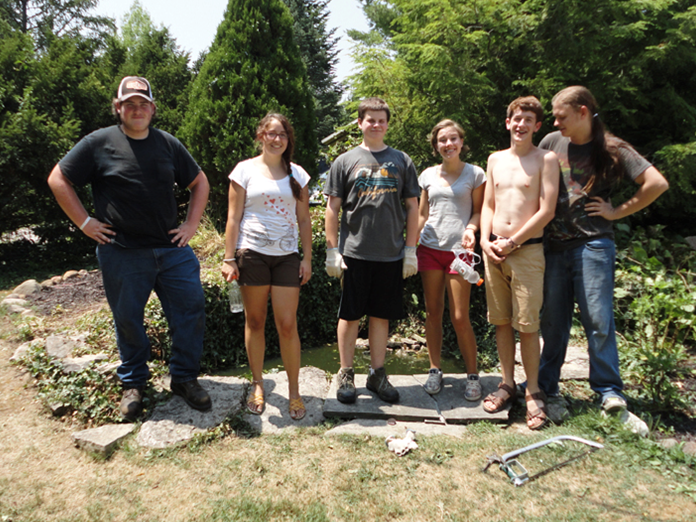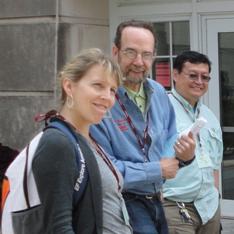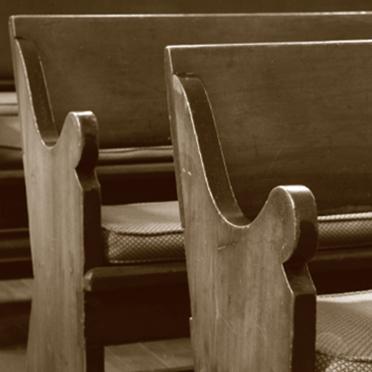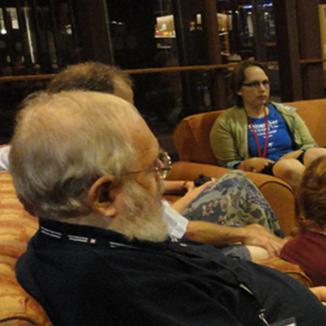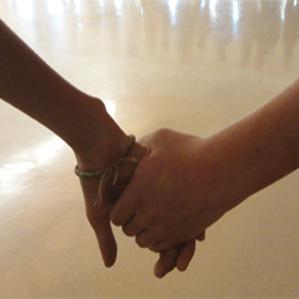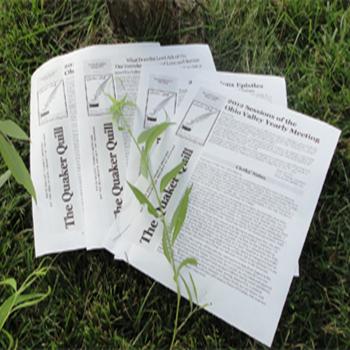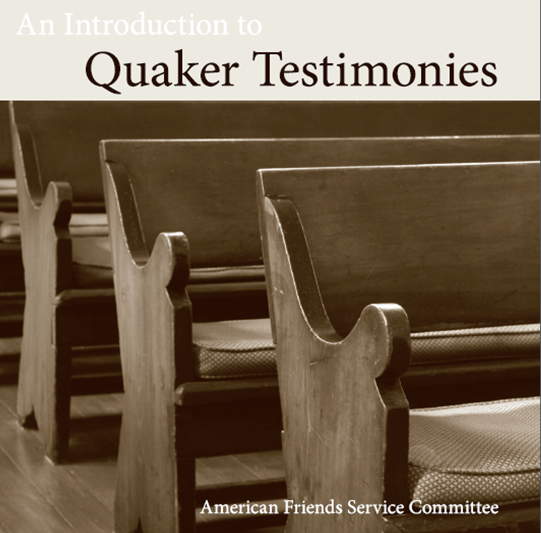About the Quaker Faith
Quakers is the name most often used to describe the 215,000 worldwide members of the Religious Society of Friends. The name Friends is frequently used as well. At its beginning in the 1650s in England, under the leadership of George Fox, the early followers were called Seekers, Seekers of the Truth, Friends of Truth or Children of the Light. Despite much persecution from the crown, Cromwell and other Puritans, many of these seekers spread the word of this religion which appeared to capture much of the spirit of the early Christians. Friends travelled with their message to the English colonies and to several countries in Europe and gained many adherents.
Worldwide, the vast majority of Friends confess an orthodox Christian faith. Friends' emphasis has always been on the role of the immediate guidance of the Holy Spirit, however, most Friends believe that the Spirit is unchanging and will not contradict itself. On this basis, the Christian Scriptures and tradition are highly esteemed as testimony to God's relationship with our spiritual ancestors. Crucially, because most Friends consider the Scriptures to be inspired by God, the Bible is helpful in weighing whether new inward guidance comes from the Spirit of God or from another source.
The immanence of God implies that all persons are children of the Divine and brothers and sisters of one another.
As within ourselves we become conscious of the same Spirit (the "Inward Light" or the "Christ Within"), and as we submit ourselves to its leadings, we also are enabled to live in conformity to the will of God. Quakers believe that every person is a vehicle of God.
All have the capacity to discern spiritual truth and to have direct communication with God. Each individual must prayerfully seek individual guidance and must follow the Inner Light as it guides them. Each will be helped by studying the developing interpretations of God in the Bible and the ideas of the great spiritual leaders of all faiths, of which the life and writings of Gandhi are but a single example. Of significant help is pondering the life and teaching of Jesus.
Love, the outworking of the Divine Spirit, is the most potent influence that can be applied in and to human affairs, and this application of love to the whole of life is seen by Quakers as the core of the Christian Gospel.
"A new commandment I give unto you, that you love one another; as I have loved you, that you also love one another. By this shall all know that you are my disciples, if you have love one to another." (John 13:34-35)
What do Quakers Believe
Originally Published by the Quaker Information Center
It is difficult to write a description of Friends beliefs that would be acceptable to all the Quakers in the world today. Quakers all share common roots in a Christian movement that arose
in England in the middle of the 17th Century. Today, it is generally true that Friends still adhere to certain essential principles:
• a belief in the possibility of direct, unmediated communion with the Divine (historically expressed by George Fox in the statement, "Christ is come to teach his people himself"); and
• a commitment to living lives that outwardly attest to this inward experience
Nowhere are these differences more marked than in the United States which contains four distinct branches of Friends. In worship, some Friends still practice unprogrammed "silent" meetings with no formal minister or liturgy, while other Quakers now have programmed services led by a pastor, similar to many Protestant denominations. In belief, some Friends place most emphasis on the teachings of Christian Scripture, while others give greater emphasis to the importance of the Inward Teacher ("that of God in everyone"), allowing for a wide range of religious perspectives.
For many Friends (especially the unprogrammed, "liberal" branch) it is not important that we all have similar beliefs. These Friends would say that is not one's beliefs that make one a Quaker. Rather, it is participation in Friends community, the deep search for Divine Guidance, and the attempt to live faithfully in harmony with that Guidance that make a person a Quaker.
The lack of a creed or clear description of Quaker beliefs has sometimes led to the misconception that Friends do not have beliefs or that one can believe anything and be a Friend. Most Quakers
take the absence of a creed as an invitation and encouragement to exercise an extra measure of personal responsibility for the understanding and articulation of Quaker faith. Rather than rely on
priests or professional theologians, each believer is encouraged to take seriously the personal disciplines associated with spiritual growth. Out of lives of reflection, prayer, faithfulness, and
service flow the statements of belief, both in word and in deed.
From Pacific Yearly Meeting Faith and Practice
Unlike most churches, Friends don't require a particular set of beliefs, dogma, or catechism. As a result, it has been difficult to codify a specific set of Quaker beliefs. It has been said, "Ask four Friends a theological question and you get five answers."
Traditionally, Friends are a Christian group, but beliefs about Jesus vary. Some hold beliefs similar to other Christian churches while others do not believe in any special divinity for Jesus or question traditional formulations of God. Others bring Eastern meditation practices into their religious practice. Even the most traditional Friends' beliefs, such as our Peace Testimony, are viewed in various ways.
Our diversity of belief is a strength. It allows us to find commonality with many and to accept people as they are. What unites us is more important than what divides us. Friends believe that there is "that of God in every person," as George Fox said, but it is more to the point to say that Friends seek to do right action. In other words, what one does as a result of your faith is more important than the specific beliefs of that faith. A faith that does not motivate a believer to live a life that respects and cares for others and the planet we share is useless.
Over many years, Friends have written lists of "advices and queries" aimed at guiding them toward this right action. One of the oldest of these, The Advices of the Elders at Balby (1656), concludes with "...these things we do not lay upon you as a rule or form to walk by; but that all, with a measure of the light, which is pure and holy, may be guided: and so in the light walking and abiding, these things may be fulfilled in the Spirit, not the letter, for the letter killeth, but the Spirit giveth life." We are guided by the Spirit, not by rules.
Friends in Friends General Conference (FGC) continue the 350 year-old tradition of silent worship. We have no presiding priest, pastor, or minister. Friends believe that within each person is a divine spark or "Inner Light" of Christ and that every person is a vehicle of God; a carrier of the Spirit of Christ.
There is no creed, no prepared order of worship, and no sermon. Worship is guided by the Holy Spirit. This simple Christian form of worship seeks for direct communication and communion with the Divine without intermediary. The sense of worship may be expressed in the awe that is felt in attentive silence, on the awareness of our profound connectedness to one another, and connectedness to nature and its power. In worship can be found repentance and forgiveness in the acknowledgement of God as the ultimate source of our being and the serenity of accepting God's will. Each experience in worship is different as God reaches to us as individuals in our current situation and circumstance. There is no right way to prepare for spiritual communion, no set practice to follow when worship grows out of expectant waiting in the Spirit. Worship depends far more on a deeply-felt longing for God than upon a specific practice or format.
"Ask and it will be given you; seek, and you will find; knock, and it will be opened unto you." (Matt 7:7)
During Meeting for Worship, a member of the group may be moved to speak out of the silence, to share a leading from God, or a prayer, passage of Scripture, or even words of an inspirational poem or hymn. Fellow worshippers are called to listen with openness of heart and mind. Messages may be meant for a member of the gathered meeting or for all in attendance. Sometimes the silence remains unbroken. After a suitable period, usually around an hour, Meeting for Worship is ended by two worshippers shaking hands, followed by handshakes by all in attendance.
Quakers strive to follow and exemplify various spiritual principles that we refer to as Testimonies. The Testimonies are about the way Quakers try to lead their lives. This attempt to put faith into practice, often with great difficulty, arises from an understanding of certain values and principles that are central to the Quaker faith. The most important of these are truth (or honesty), equality, community, simplicity, stewardship, and peace. There are a number of good resources on the Testimonies, including the AFSC pamphlet An Introduction to Quaker Testimonies. You can download a PDF file of this pamphlet by selecting the Download link near the bottom of the American Friends Service Committee's Introduction to Quaker Testimonies Page.
From the beginning of the Religious Society of Friends, the respect for "that of God in everyone" has led Friends to oppose war and capital punishment. Women and men have been considered equal in worship, ministry, and conducting the business affairs of the Meeting (individual congregation).
Eighteenth and nineteenth century Friends, such as John Woolman, were early abolitionists and participated in the Underground Railroad. Many Quaker women, including Susan B. Anthony and Lucretia Mott, were in the forefront of the women's movement for the right to vote, family planning, and prison reform. Friends were early and strong advocates for a public education system in America. Many Quakers founded schools for the education of Native Americans and former slaves.
In a materialistic society, Friends strive to "live simply so that others may simply live." Friends' Testimonies have historically been distinctive and definitive. They are a common set of deeply held, historically rooted attitudes and modes of living in the world. Testimonies bear witness to the truth as Friends in community perceive it, truth known through relationship with God. These include peace, simplicity, community, and equality. Friends conduct business in a spirit of worship and listening. Decisions are reached only through the unity of the Meeting by utilizing a model of consensus decision-making with an emphasis on divine guidance. Some modern business practices have patterned themselves based on this Quaker model.
The theology that George Fox and early Friends proclaimed to the world is the seed from which the Religious Society of Friends in all its present day diversity arose.
Fox lived in 17th century England and was in his early twenties when he entered into a serious state of despair over his inability to find a church or teacher that embodied or "possessed" the spiritual truths they preached and professed as Christians.
True believers were not those who claimed to be so, but those who had passed from death to life. God did not dwell in temples made with hands...but in people's hearts.
There was an anointing within man to teach him, and that the Lord would teach his people himself; and again, that there is one, even Christ Jesus, that can speak to thy condition.
It is interesting to note that these revelations, which we sometimes take as the core of our Quaker "theology," were not in and of themselves a solution for Fox. He continued in misery despite the convincing power of these insights. There continued in him a struggle between the truths he saw and the "ocean of darkness and death" that competed with them in his own nature.
The message that came from Fox's life was that we do not simply arrive at "truth." The process is one that takes time, persistence, patience and faith. In a way, we must learn to see the entire scriptural narrative replicated in our own inward lives. We start in an "ocean of darkness and death" and through faithful attention to the "anointing" within, we come slowly through to the resurrection and life promised by God in the beginning.
According to Fox and early Friends who felt Fox's message resonate in them, the Christ of history, the Christ who suffered crucifixion and rose again - the light and word of God that John spoke of in his gospel - dwells palpably in the depths of every human person. This Christ is not in us as merely a presence or aura; Christ is a real power working in us to redeem us from the spiritual death that is the "normal" or "natural" state in this world. Christ, the Word, the Light, the Seed, dwells within us to lead us to life. This message was wildly resonant in 17th century England. For a time, the movement started by Fox grew faster than any other Christian movement.
As "Quakerism" gained acceptance and legitimacy over time, and as Friends went through the intellectual movements of the 18th, 19th, and 20th centuries - "Enlightenment," "Quietism," "Secularism" and "Universalism" in particular - it lost its radical Christian edge and also the early unity of theological vision. Friends today seem much more comfortable talking about the "Inward Light" or "that of God" in everyone than they do about Jesus Christ. This inward presence or voice does not always cause us the long struggle or distress it did for Fox. It is simply our most authentic personal self, the reference point to which we return in determining how we shall act in this world.
If one looks at Faith and Practice there is really no clear statement of Quaker theology. Indeed, the use of the term "Discipline" for the document implies that the focus will be not on defining a theology for the group but on the behaviors that flow out of Friends' communal experience of the Spirit. Introductory quotes from respected Friends let us know that the purpose of Faith and Practice is to "make our testimonies clear" and give notice of the "rules" that will govern how we evaluate those who profess to be Quakers. The Faith section defines our "faith" as the "hearing and obeying of the Spirit," which Friends have traditionally called "the Divine Spirit," "The Inward Light, "The Christ Within," The Seed," or "That of God in Everyone," but it makes no effort to tie that Spirit to the Christian scriptural narrative. Rather, our discipline bases our communal faith in the silence, which is seen as the foundation of all authentic worship.
Friends believe that the Spirit we meet in worship will open truth to all who truly seek to be led by it. There is an implied faith that this Inward Spirit and Voice will lead people today as it always led them and that the truths unveiled and the behaviors sanctioned will be similar to what has been unveiled and sanctioned in the past-that the "testimonies" that flow from faithfulness will be what they have always been: truthfulness, integrity, simplicity, justice, stewardship and peace.
George Fox asserted that he came to his faith "experimentally," through his own inward experience of Christ; and the Religious Society of Friends still places primary emphasis on that inward presence of the Spirit which we find in meeting for worship. That communal experience of spirit remains the foundation for our testimonies, but increasingly we find no unity among us on the nature of the inward guide or the theology we use to explain it.
What is a Meeting for Worship?
We call our services "Meetings" because in such assemblies, we meet with one another and with God in holy fellowship. There is no formal order of service and attenders may sit wherever they wish. All participants sit quietly, listening to the leading of the Inner Light, God, or Christ within. It is customary to allow time at the beginning for centering in silence. After about 15 minutes, Friends who are truly moved to speak may speak their message. It is unlikely that any single person will feel moved to speak more than once at a meeting, or at every meeting. Silence should be observed between messages. It is not customary for Friends to bring prepared messages, since all messages should flow from the spirit of the Meeting. A Meeting may have many messages, or be completely silent. In either case, if we have allowed ourselves to be still, we will be drawn together and uplifted in love. Meeting for worship ends when a designated person shakes hands with a neighbor, and then everyone else does the same.
At some meetings, following the period of worship, there may be time for afterthoughts. Afterthoughts are those messages, which we are not sure are spirit-led but we feel compelled to share. There may also be time for introductions and announcements, and there may be time to share joys and sorrows with each other.
Why do we call the building a Meetinghouse?
The Church is the group or body of believers, not the building. The building is the place where our spiritual community meets.
Where is the Minister?
We believe we are all ministers one to another. In unprogrammed meetings there is no paid minister of our Friends Meeting. We share the responsibility for vocal ministry, for the care of each other, and the Meeting. If you have any questions about the Meeting, ask the person who leads the announcements.
Why do we have two names: Quakers and Friends?
Our official name is the Religious Society of Friends (see John 15:15). We are also known as Quakers. When we first started, over 350 years ago, our newfound spiritual power sometimes caused us to tremble with fervor, and we were called Quakers as a form of ridicule. The name stuck and we carry it with pride.
What do Friends believe?
We believe in that of God in everyone; however, there is no written creed. We use our book, Faith and Practice as a guide.
Where are children during Meeting?
The children are welcome to join us for worship, or they may leave for classes. Baby-sitting through the hour may be available for infants. We encourage parents to choose the extent of inclusion that meets the needs of their children, themselves as worshipers, and the other worshipers in the meeting.
What is the source of meetings' financial support?
Most meetings are completely supported by financial contributions from members, attenders, and visitors. There will usually be a collection box near the door. You can ask the clerk or treasurer of the meeting if it is set up to do an automatic monthly withdrawal from individuals' checking accounts.
Is there religious education for adults?
Many Meetings discuss readings and topics of interest. Occasionally, most also have special programs. Most local Meetings provide pamphlets and some have libraries where you may borrow books. We also have copies available of Faith and Practice.
Is there special counseling available?
Sometimes we need special help. Then we can go to our local meeting and request that a group of Friends get together in prayer and worship to seek clearness. This is not the same as psychotherapy or professional counseling, but the clearness process has long been of great value to Friends.
How can I get to know other people?
There are many ways to meet other people from Meeting on an informal basis, but one of the best ways to get to know us is to join Friends in a potluck meal. Most meetings host potlucks once a month.
Another way is to work on committees with us. This is a good way to learn Quaker process: how we think and work together. Most of the work of a Meeting gets done in committees, many of which welcome attenders. A few are limited to members because they deal in confidential matters. Ask a Friend in your meeting who you should talk to about committees.
How can I get the newsletters?
Quaker Quill, the Yearly meeting newsletter is published quarterly and available for download as a .PDF file from the Quaker Quill Page of this website. You can also contact the to be put on the mailing list.
How does the meeting conduct its business?
The business meeting is facilitated by the Clerk. The process is based on the belief that God can guide us in our business affairs, as in other parts of our lives. Because of this, they have been traditionally referred to as "Meetings for Worship with Attention to Business." Decisions are not made by majority rule because the truth is not necessarily held by the majority. Rather, decisions are made by listening for the "sense of the Meeting." If agreement is not reached, the matter is reconsidered at a later date.
The actual work is done through standing committees. Concerns are first brought to the attention of the appropriate committee, which handles the matter if possible. If a meeting-wide decision is required, the matter is brought to Monthly Business Meeting, together with the committee's recommendation.
To bring a matter to the attention of a committee, contact the clerk of that committee.
I keep hearing the term "Monthly Meeting." Don't you have worship every Sunday?
Meeting for Worship is indeed help weekly by almost all local meetings. In addition to Meeting for Worship, a business meeting (Meeting for Worship with a Concern for Business) is held once a month; hence the name, Monthly Meeting. The Monthly Meeting is the primary organization of the Religious Society of Friends. The Monthly Meeting organizes activities to foster community, spiritual growth, and spiritual inspired social action. The Monthly Meeting also has responsibilities such as acceptance of new members and oversight of marriages. Each Monthly Meeting manages its own finances and property.
Is the local monthly meeting part of any larger organization(s)?
Neighboring Monthly Meetings meet together for business, fellowship, and fun. These gatherings are called Quarterly Meetings, because they meet once a quarter.
Monthly meetings are also members of the Yearly Meeting. The Yearly Meeting provides guidance in Faith and Practice by working with local meetings to publish and maintain a handbook, and publish the newsletter, the Quaker Quill. It supports a variety of Quaker service organizations such as the American Friends Service Committee, and the Friends Committee on National Legislation.
Ohio Valley Yearly Meeting in turn participates in Friends General Conference and Friends World Committee for Consultation. There are many other Quaker organizations for those who have special interests.
How do social concerns grow from Friends' beliefs?
Most Friends believe that faith must find expression in action in the world around us. The Religious Society of Friends is not a political organization. Our belief that there is that of God in every person has led some Quakers to be in the forefront on many social reform and peace movements.
What holidays do Friends celebrate?
Friends hold to the belief that each day is sacred. No holidays are particularly special, but we do generally celebrate Christmas, Easter, and other holidays with the rest of the wider society. Our testimony of simplicity lead most Friends to refrain from making too much of any one day, but there are no prohibitions to enjoying holidays.
How to I become a member?
After attending Meeting for Worship for a time, if you are drawn into the fellowship of the Religious Society of Friends, you may be inclined to formalize your relationship with the Meeting. Friends accept into active membership those whose declarations and ways of life manifest unity with Friends views and practices. Applicants should address a letter to their local Meeting indicating their wish to join. They then enter into a clearness process outlined in Faith and Practice to determine if they are ready to become members.


